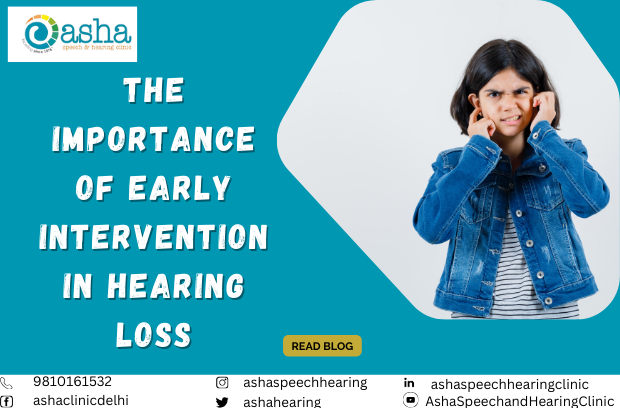Hearing loss is one of the most common sensory deficiencies found among humans today. Moreover, the World Health Organization (WHO) estimates that roughly 63 million persons in India have Significant Auditory Impairment. Experts recommend that, for effective ear care, early intervention in hearing loss and ear disorders is necessary. Unfortunately, many people don’t know the importance of early intervention in hearing loss. As a result, people with hearing impairment fail to communicate properly for the rest of their lives.
Therefore, to create awareness among the public, in this blog, we have addressed the significance of early intervention and identification of hearing loss. Continue reading to learn how early intervention of hearing loss will help a person.
What is Early Intervention for Hearing Loss?
Early intervention is a type of clinical support and services provided to babies and young children with developmental disabilities and delays. In the case of hearing loss, early intervention is a strategy that therapists will employ to reduce the effect of hearing loss on a kid.
Especially, with early detection and intervention for hearing loss, the quality of life of a person can be improved. Furthermore, the earlier it is detected, the easier it can be for the family, as you will have faster access to the services and information you require to effectively nurture and assist your child.
Identifying the Early Signs and Symptoms of Hearing Loss
Fortunately, hospitals perform hearing loss screening on almost all newborns before they discharge them to home. This implies that you will be informed as soon as a hearing impairment is discovered if your child was born with one. Although hearing loss is not very prevalent, it can occur later in life and it is vital to be aware of it. However, if the hearing loss is not identified, it may influence how your child picks up language and communication skills, which will have a big influence on their adult life.
The following are some typical warning signs that could point to hearing loss:
- Speech comprehension issues, particularly in noisy settings
- Frequently asking people to repeat themselves
- Increasing the volume of electronic gadgets
- Feeling like others are not speaking clearly
- Avoiding social interactions
- Having trouble hearing some consonants or high-pitched sounds
- Hearing buzzing or ringing sounds in the ears
If you or a loved one is exhibiting any of these symptoms, immediately consult a hearing healthcare professional for a thorough diagnosis and suitable treatment choices. Along with babies, preschool children, and older adults, people who work in noisy areas or chemical industries and those who take ototoxic medications are at risk of getting hearing impairment. People with hearing loss can greatly enhance their quality of life with early detection and intervention.
The Importance of Early Intervention in Hearing Loss
Would you like to know why early detection and early intervention are essential in hearing loss? Well, take a look below to know about it.
In general, to treat hearing loss, early detection is essential. Furthermore, early detection and intervention of hearing loss allows people to take proactive measures to stop additional harm and enhance their quality of life.
Here are some fundamental reasons why early diagnosis and intervention in hearing loss is important:
- Early identification of hearing loss allows for rapid intervention, which can delay or stop the progression of the problem.
- Early detection provides a greater choice of treatment alternatives such as hearing aids, assistive listening devices, and cochlear implants.
- According to research, untreated hearing loss can contribute to cognitive decline and increase the risk of illnesses such as dementia. Early intervention may assist in reducing these risks.
- Early intervention for hearing loss can greatly enhance communication skills, resulting in improved social interactions and interpersonal relationships.
- Intervention for hearing loss early on improves a person’s ability to actively participate in conversations, appreciate music, and engage in a variety of activities, all of which contribute to a higher quality of life.
People of all ages may lose their hearing capacity. However, controlling its effects and preventing additional damage depends heavily on early detection and intervention. Furthermore, it is critical to prioritize frequent hearing tests and seek expert assistance if any indicators of hearing loss are detected.
Know the Treatment Options for Hearing Loss
Individuals have various alternatives for treating hearing loss. These alternatives include medical therapies, assistive technologies, and communication tactics.
The following are some of the most prevalent treatments for hearing loss:
- The utilization of hearing aids, cochlear implants, and middle ear implants.
- Rehabilitative therapy to improve perceptive skills while also developing communication and linguistic ability.
- The use of sign language and other sensory replacement techniques such as speech reading, print on palm, and signed communication.
People with hearing loss can also improve their communication skills and education through the use of hearing-assistive technology and services. It includes alerting devices, telecommunication devices, frequency modulation and loop systems, captioning services, and sign language interpretation.
Conclusion
To sum up, it is essential to understand the importance of early intervention in hearing loss. Individuals who seek care as soon as feasible can improve their quality of life and avoid further deterioration. No matter whether it is through hearing aids, cochlear implants, or other interventions, acting early can make a big difference in maintaining communication, relationships, and general well-being.
At Asha Speech and Hearing Clinic, we know the significance of early diagnosis and treatment for hearing loss. Therefore, our team of experts offers comprehensive care to children of all ages, including screening for hearing loss and making recommendations for additional testing and treatment as necessary.
If you are concerned about your or your child’s hearing, book an appointment with us. We are here to give the help and advice required to guarantee overall good health and development.

